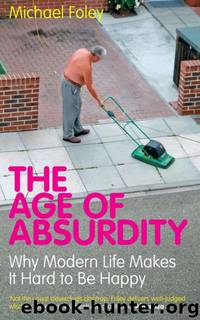The Age of Absurdity: Why Modern Life Makes it Hard to Be Happy (2010) by Michael Foley

Author:Michael Foley
Format: epub, mobi
Published: 2010-03-25T16:00:00+00:00
9
The Atrophy of Experience
It is getting towards the end of the afternoon of a heavily overcast day at the end of November. Light has long since abandoned the struggle and the rain, which threatened all day but could never summon up the energy to fall, can only hang in damp irresolution in the grey. In the doorway of a dying business the proprietor looks out in resentment and bewilderment at a world that prefers supermarkets to the overpriced and understocked Dave’s Deli. On the pavement before him schoolboys wrestle and shove, though without conviction, more from habit and a desire to postpone returning to dreary homes. Two mothers with pushchairs approach from opposite directions and come to a halt.
‘It’s closed,’ says one in outrage. ‘Some problem with the toilet. A health and safety thing. Don’t know why they can’t use the toilet in the main Centre.’
‘They couldn’t be bothered,’ the second says peevishly. ‘My Tyler is potty trained but he’s always messing himself when he’s there. I said to them, ‘He’s potty trained but you need to remind him to go’ and they said, ‘Why don’t you remind him yourself?’ I said, ‘What are drop-in staff for? I mean, what are they being paid for?’’
The other nods grimly. ‘This is what you’re up against.’
They fall silent, regarding the children so capriciously deprived of drop-in facilities. One is asleep and the other, though awake, slumps back and girns continuously, albeit in a low feeble tone without hope of salvation or even concern. Imperceptibly the sky darkens. But on the billboard across the street a handsome sports star lolls in a deckchair in bright sunshine, his sculpted-teak torso glistening with oil, golden thighs parted to present a substantial beasthood snug in tight white briefs.
As the November sky grows dark, a terrible truth becomes clear. Here, nothing is happening or going to happen. Life, in its radiance and glory, is off somewhere else.
Everyone has days like this – and for many it is November afternoon all year round. The feeling is of insubstantiality, impotence and worthlessness. The world becomes grey and dull and the buoyant heart turns to lead.
One source of such feeling is habit. Repetition and familiarity deaden perception and diminish experience. The problem is that habits are necessary. Some, for instance the rituals of employment, are unavoidable. Others have to be adopted because no one is capable of constantly making it new. To live entirely without habit would be as terrible as living entirely within it.
But the contemporary dramatization of potential intensifies the devaluation of familiar experience. It was Schopenhauer who first perceived the tendency to live, without being aware if it, in a constant expectation that is endlessly disappointed and endlessly renewed – and he understood how such an attitude makes it difficult to appreciate the present.
The siren voices of the age exacerbate this tendency to live in expectation – which runs forever ahead of realization like the hare at the racetrack pursued by slavering dogs that never catch it up or recognize it as a fake.
Download
The Age of Absurdity: Why Modern Life Makes it Hard to Be Happy (2010) by Michael Foley.mobi
This site does not store any files on its server. We only index and link to content provided by other sites. Please contact the content providers to delete copyright contents if any and email us, we'll remove relevant links or contents immediately.
| Anthropology | Archaeology |
| Philosophy | Politics & Government |
| Social Sciences | Sociology |
| Women's Studies |
The remains of the day by Kazuo Ishiguro(7587)
Tools of Titans by Timothy Ferriss(6983)
The Black Swan by Nassim Nicholas Taleb(6220)
Inner Engineering: A Yogi's Guide to Joy by Sadhguru(5922)
Giovanni's Room by James Baldwin(5904)
The Way of Zen by Alan W. Watts(5815)
The Six Wives Of Henry VIII (WOMEN IN HISTORY) by Fraser Antonia(4807)
The Power of Now: A Guide to Spiritual Enlightenment by Eckhart Tolle(4780)
Astrophysics for People in a Hurry by Neil DeGrasse Tyson(4634)
Asking the Right Questions: A Guide to Critical Thinking by M. Neil Browne & Stuart M. Keeley(4609)
12 Rules for Life by Jordan B. Peterson(3761)
The Ethical Slut by Janet W. Hardy(3523)
Skin in the Game by Nassim Nicholas Taleb(3489)
Housekeeping by Marilynne Robinson(3427)
The Art of Happiness by The Dalai Lama(3399)
Double Down (Diary of a Wimpy Kid Book 11) by Jeff Kinney(3292)
Skin in the Game: Hidden Asymmetries in Daily Life by Nassim Nicholas Taleb(3280)
Walking by Henry David Thoreau(3242)
12 Rules for Life: An Antidote to Chaos by Jordan B. Peterson(3211)
